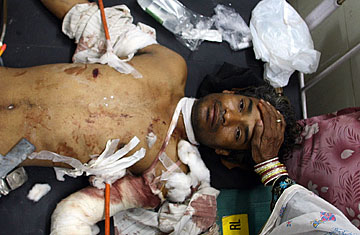
A mother attends to her injured son at Sawai Mansingh hospital in Jaipur on May 14, the day after a series of bombs tore through the city's crowded markets
Bomb attacks have hit India with a kind of grinding regularity over the past few years. Since 2005, more than 520 people have been killed and hundreds more injured in 10 major bombings around the country. Yesterday, at least 80 people died when seven or perhaps eight separate bombs exploded within minutes in the crowded central market area of Jaipur, a popular tourist city in the northwestern state of Rajasthan. Police say the bombs appear to have been strapped to bicycles and rickshaws. Though no one has yet claimed responsibility — such claims have been extremely rare after previous attacks — government officials and intelligence sources told Indian newspapers and television news stations that Islamic terrorist groups are the likely culprits. Junior home minister Shriprakash Jaiswal said "the people responsible for these attacks have foreign connections," which in India is understood to mean Pakistan or Bangladesh.
Yesterday's blasts came on the 10th anniversary of New Delhi's nuclear weapons tests in Rajasthan — tests that confirmed India as a nuclear weapons power and led to an escalation of tensions with Pakistan, which subsequently tested its own nuclear bomb. The neighbors, at loggerheads over the disputed territory of Kashmir since independence six decades ago, almost resumed hostilities earlier this decade. But in the past few years, tensions have eased, in part, because Pakistan's government and security agencies have been busy dealing with the many problems at home.
Leaders in the new government in Pakistan have also made conciliatory noises in the past few months, suggesting that India and Pakistan should work on trade and transport links and deal with the issue of Kashmir later. Ministers from the two countries are expected to meet in a few days as part of an ongoing dialogue aimed at strengthening ties. But Pakistan's leadership is split between President Pervez Musharraf and a fractious new coalition government, which overwhelmingly defeated Musharraf's party in February elections. Pakistan's intelligence and security agencies, long suspected of helping anti-Indian militants, are another factor and may not like the growing détente.
Whoever is behind the recent series of blasts, the intention is clear, says Brahma Chellaney, Professor of Strategic Studies at the Centre for Policy Research in Delhi: "They want to hurt India's economy and they want to provoke sectarian unrest between communities here." The blasts over the past three years, Chellaney and other analysts point out, have all been carried out against "soft" targets such as trains, public buildings and markets. Since 2001, India has tightened security around government officials and government offices. But in a country of India's size and population, it's impossible to guard against all attacks. "They've attacked India's Silicon Valley, India's commercial capital [Mumbai] and now they've attacked a famous tourist city," says Chellaney. "These targets are being chosen across the length and breadth of India to drive home the message that the country is vulnerable."
It doesn't help that India's intelligence and security services are often uncoordinated and, especially at a state level, lack the capacity to sniff out terrorist cells. "The IB [Intelligence Bureau] can't be everywhere — they're spread really thin," says M.K. Dhar, who worked at the agency for 30 years and retired as its No. 2 top operative in 1996. "The bigger problem is state police intelligence is almost nonexistent. The state police are not training and not deployed to deal with terrorism and to gather intelligence. All of this must be mended, and a comprehensive strategy must be devised."
Dhar, author of the 2005 book Open Secret: India's Intelligence Unveiled, says India must ramp up its intelligence-gathering and -sharing capabilities, possibly by creating a specialist force to deal with terrorism. Without arrests or a claim of responsibility, even yesterday's bombing are likely to remain a mystery, he says. "We know that there are ... [terrorist] training camps in Bahawalpur in Pakistan across the border from Rajasthan. This looks like a pre-planned ISI [Pakistan's Inter Services Intelligence unit] pattern: strike mosques on Fridays and Hindu temples on Tuesdays, Tuesday being the day when Lord Hanuman is worshiped. This attack was also well-designed and well-planned like the one on Benaras," he says. "But unless there are arrests, it is difficult to say who is behind it for sure."
